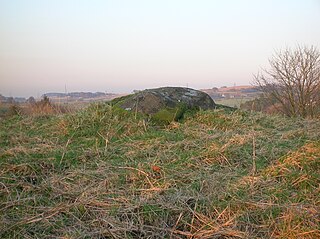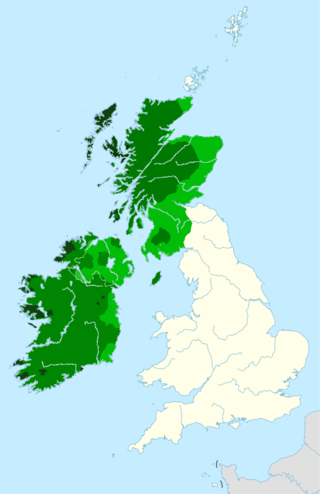The Goidelic or Gaelic languages form one of the two groups of Insular Celtic languages, the other being the Brittonic languages.

Loch is a word meaning "lake" or "sea inlet" in Scottish and Irish, subsequently borrowed into English. In Irish contexts, it often appears in the anglicized form "lough".

The letter yogh (ȝogh) was used in Middle English and Older Scots, representing y and various velar phonemes. It was derived from the Insular form of the letter g, Ᵹᵹ.

Shinty is a team sport played with sticks and a ball. Shinty is now played mainly in the Scottish Highlands and among Highland migrants to the big cities of Scotland, but it was formerly more widespread in Scotland, and was even played in Northern England into the second half of the 20th century and other areas in the world where Scottish Highlanders migrated.

In Gaelic myth, the Cailleach is a divine hag and ancestor, associated with the creation of the landscape and with the weather, especially storms and winter. The word literally means 'old woman, hag', and is found with this meaning in modern Irish and Scottish Gaelic, and has been applied to numerous mythological and folkloric figures in Ireland, Scotland, and the Isle of Man. In modern Irish folklore studies, she is sometimes known as The Hag of Beara, while in Scotland she is known as Beira, Queen of Winter.
Scottish English is the set of varieties of the English language spoken in Scotland. The transregional, standardised variety is called Scottish Standard English or Standard Scottish English (SSE). Scottish Standard English may be defined as "the characteristic speech of the professional class [in Scotland] and the accepted norm in schools". IETF language tag for "Scottish Standard English" is en-scotland.
The vast majority of placenames in Ireland are anglicisations of Irish language names; that is, adaptations of the Irish names to English phonology and spelling. However, some names come directly from the English language, and a handful come from Old Norse and Scots. The study of placenames in Ireland unveils features of the country's history and geography and the development of the Irish language. The name of Ireland itself comes from the Irish name Éire, added to the Germanic word land. In mythology, Éire was an Irish goddess of the land and of sovereignty.

The history of the Scots language refers to how Anglic varieties spoken in parts of Scotland developed into modern Scots.
Teuchter is a Lowland Scots word sometimes used to offensively describe a Scottish Highlander, in particular a Gaelic-speaking Highlander. It is offensive, equivalent to other cultural epithets used by more powerful groups to describe people they have oppressed, but is often seen as amusing by the speaker. The term is contemptuous, essentially describing someone seen to be uncouth and rural.
A bogle, boggle, or bogill is a Northumbrian and Scots term for a ghost or folkloric being, used for a variety of related folkloric creatures including Shellycoats, Barghests, Brags, the Hedley Kow and even giants such as those associated with Cobb's Causeway. They are reputed to live for the simple purpose of perplexing mankind, rather than seriously harming or serving them.
Galwegian Gaelic is an extinct dialect of Scottish Gaelic formerly spoken in southwest Scotland. It was spoken by the people of Galloway and Carrick until the early modern period. Little has survived of the dialect, so that its exact relationship with other Gaelic language is uncertain.

The Norse–Gaels were a people of mixed Gaelic and Norse ancestry and culture. They emerged in the Viking Age, when Vikings who settled in Ireland and in Scotland became Gaelicised and intermarried with Gaels. The Norse–Gaels dominated much of the Irish Sea and Scottish Sea regions from the 9th to 12th centuries. They founded the Kingdom of the Isles, the Kingdom of Dublin, the Lordship of Galloway, and briefly ruled the Kingdom of York. The most powerful Norse–Gaelic dynasty were the Uí Ímair or House of Ivar.

The languages of Scotland belong predominantly to the Germanic and Celtic language families. The main language now spoken in Scotland is English, while Scots and Scottish Gaelic are minority languages. The dialect of English spoken in Scotland is referred to as Scottish English.

Carlin Stone or Carline Stane is the name given to a number of prehistoric standing stones and natural stone or landscape features in Scotland. The significance of the name is unclear, other than its association with old hags, witches, and the legends of the Cailleach.

The Gaels are an ethnolinguistic group native to Ireland, Scotland and the Isle of Man. They are associated with the Gaelic languages: a branch of the Celtic languages comprising Irish, Manx and Scottish Gaelic.

The etymology of Skye attempts to understand the derivation of the name of the Isle of Skye in the Inner Hebrides of Scotland. Skye's history includes the influence of Gaelic, Norse and English speaking peoples, and the relationships between their names for the island are not straightforward. Ultimately, like other Scottish locations as Islay, Lewis and Arran, the origin of the name is still debated and may be impossible to discern with all known evidence.

Scottish toponymy derives from the languages of Scotland. The toponymy varies in each region, reflecting the linguistic history of each part of the country.

The modern names of Scottish islands stem from two main influences. There are many names that derive from the Scottish Gaelic language in the Hebrides and Firth of Clyde. In the Northern Isles most place names have a Norse origin. There are also some island place names that originate from three other influences, including a limited number that are essentially English language names, a few that are of Brittonic origin and some of an unknown origin that may represent a pre-Celtic language. These islands have all been occupied by the speakers of at least three and in many cases four or more languages since the Iron Age, and many of the names of these islands have more than one possible meaning as a result.





















